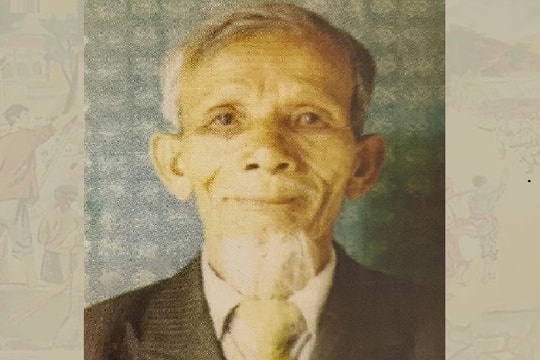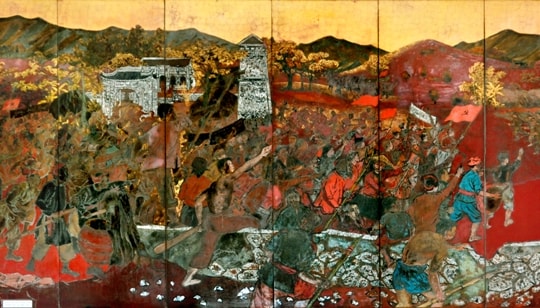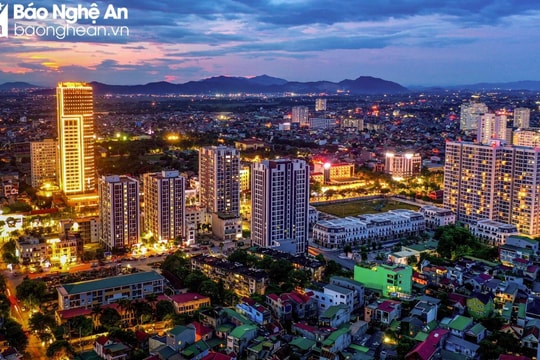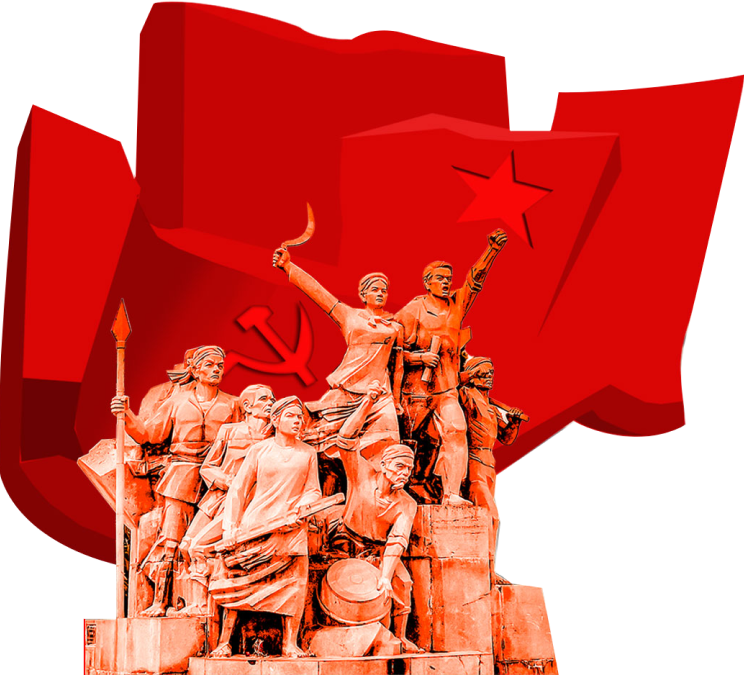Martyrs Hoang Van and Hoang Bong - Two typical examples of Yen Thanh district in the Nghe Tinh Soviet
The two brothers Hoang Van and Hoang Bong were soon enlightened about the revolution and made many contributions to the Nghe Tinh Soviet movement of 1930-1931.
Before 1945, Do Thanh commune belonged to Quy Trach commune, Yen Thanh district, a land rich in tradition of learning and patriotism. Comrades Hoang Van and Hoang Bong were born in Xuan Lai village, Quy Trach commune (now Xuan Lai hamlet, Do Thanh commune), Yen Thanh district, Nghe An province, and were descendants of the Hoang family in Xuan Lai. According to many ancient documents, the Hoang family was one of the first families to come to open up and establish a village in this land.
Comrade Hoang Van (1900-1931) and his younger brother Hoang Bong (1908-1931) were born into a wealthy farming family with enough food and property. Therefore, from a young age, the two brothers Hoang Van and Hoang Bong were sent by their family to study Chinese characters, national languages and etiquette. Naturally intelligent, and with their parents' education, Comrade Hoang Van soon absorbed patriotic poetry and literature, and progressive patriotism and love for the people.
At the end of 1926, after returning from a political training course in Guangzhou, comrade Vo Mai[1] started to establish Vietnamese Revolutionary Youth cells in Dien Chau, Yen Thanh, and Anh Son districts.
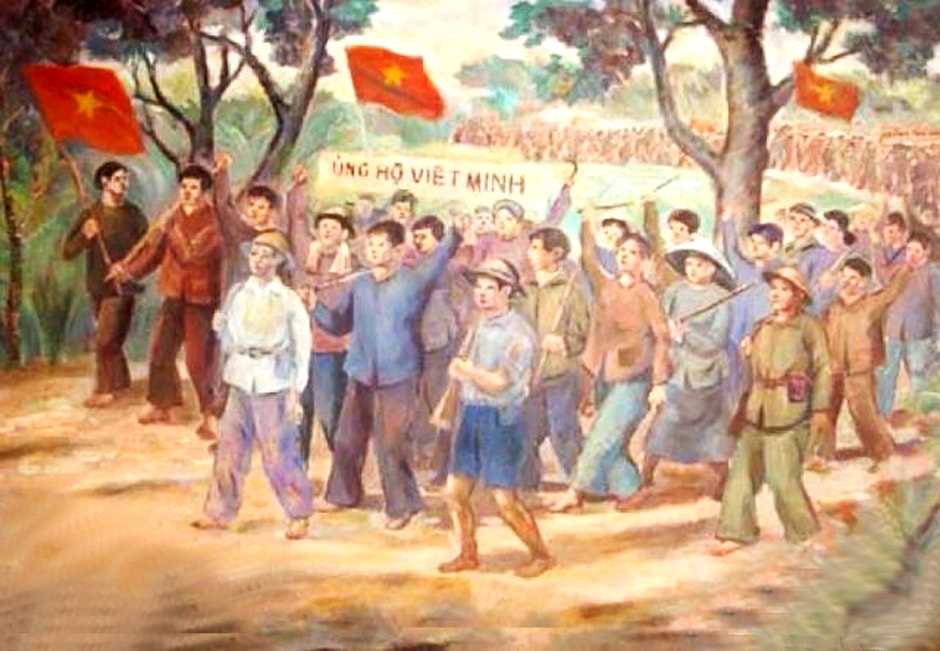
In 1927, in Xuan Lai, young people who were sensitive to the current events of the village such as Hoang Van, Ho Lac, and Luyen Nhan also established a group of patriotic youth who met together and secretly passed around progressive books, newspapers, and documents. By the end of 1927, through Bui Xuan Nam[2], the group was contacted by comrade Vo Mai, gathered, and established the organization "Revolutionary Youth Comrades Association of Quy Trach General".
In order to carry out the purpose of uniting progressive patriotic forces to make a revolution to drive out the imperialist invaders and gain freedom for the nation, comrade Hoang Van and the members actively participated in propaganda work and enlightened the brothers and people of Xuan Lai village. Thanks to that, in a short time, the number of members of this organization increased from 7 to 20.
With the encouragement of his brother, comrade Hoang Bong enthusiastically participated and became one of the active members of the Association. Besides propagating revolutionary enlightenment, Hoang Van, Hoang Bong and the comrades of the "Revolutionary Youth Association of Quy Trach General" mobilized people and successfully organized many "rice borrowing" campaigns from landlords Luyen Tan, Cuu Co, Duong gang, Vu Man... to help people starve on a large scale in the entire Quy Trach General.
In 1930, the revolutionary movement in the province developed strongly. To develop the revolutionary base and movement, the Central Region Party Committee and Nghe An Provincial Party Committee decided to send a number of key cadres such as Nguyen Huu Binh, Ton Thi Que... to reinforce Yen Thanh and Dien Chau. Thanks to the guidance of the comrades, the revolutionary movement of the people of Yen Thanh in general and of Xuan Lai in particular had a strong development in both quality and quantity.
In mid-October 1930, comrades Nguyen Huu Binh, Chu Trang, and Phan Lac directly went to Quy Trach commune to organize meetings to disseminate the Provincial Party Committee's policies. At the meeting held at Le Con's house in Yen Dinh village, comrades including Hoang Bong, Ho Lac, and Le Con... discussed plans to prepare for the demonstration on November 7, 1930, to demonstrate the strength of the masses, demand tax reduction and postponement, and protest against the feudal nationalism's suppression of workers in Vinh Ben Thuy and farmers in Hung Nguyen...
Implementing the plan, comrades Hoang Van and Hoang Bong actively participated in the work of mobilizing the people through the activities of distributing leaflets and giving speeches. As planned, early in the morning of November 7, 1930, the sound of drums and wooden fish resounded loudly. The demonstration group in the lower district, including people from Xuan Lai, Dai Lo, Gia My villages, led by comrades Luyen Nhan, Ho Lac, Hoang Van - Hoang Bong, and Bui Xuan Nam, arrived at the gathering point. The group walked while shouting slogans of struggle and distributing leaflets, while on both sides were self-defense forces carrying primitive weapons to protect them.
Along the way, the masses from other villages from all directions joined the protest in increasing numbers. Frightened by the momentum of the protest, the local feudal puppet government retreated to their homes, not daring to take any action. When the protest reached the Muong bridge area (in Tuong Lai village), the Dien Chau garrison commander promptly dispatched soldiers in blue uniforms and legionnaires to suppress them. The Western team leader ordered the soldiers to shoot directly at the leaders, causing Mr. Ngo Cuong, Nguyen Dot, Hoang Uoc to die and several others to be injured. To preserve their strength, the comrades guided the people to temporarily retreat.
On the evening of November 9, 1930, comrades Luyen Nhan, Hoang Van - Hoang Bong... mobilized more than 1,000 people from Xuan Lai, Dai Do, Gia My, and Phu Tang villages to gather at Con Diec (Tho Thanh) to rally, demonstrate force, and hold a memorial service for those who died in the demonstration on November 7, 1930.
On November 10, 1930, the Yen Thanh District Provisional Party Committee was established with 5 comrades, with comrade Nguyen Ung as Secretary. Immediately after its establishment, the District Party Committee Executive Board assigned District Party Committee members to the communes to develop Party cells and mass organizations. In Xuan Lai, after the demonstration on November 7, 1930 and the evening of November 9, 1930, the puppet government apparatus was paralyzed and no longer dared to harass the villagers as before. Comrades Hoang Van and Hoang Bong joined the Xuan Lai Commune Farmers' Association (Red Farmers' Association) to take on the management and operation of all aspects of the village in place of the puppet government. The comrades openly organized classes to learn the national language, fought to demand that the local landlords return a part of the public land to be distributed to the people, and abolished the "surcharge and over-supply"...
In December 1930, thanks to the direct guidance of the Provincial Party Committee as well as the active activities of the District Party Committee comrades, the Quy Trach - Quan Hoa combined Party cell was born, promptly leading the struggle movement of the Xuan Lai masses. Under the leadership of the Quy Trach General Party cell, comrade Hoang Van - Hoang Bong and comrades in the Red Farmers' Association mobilized and guided the people of Xuan Lai to organize many struggles such as: the struggle on February 17, 1931 of the people of the entire Quy Trach General to rally and give speeches to expose the crimes of the imperialist occupation; on February 24, 1931, the people of Xuan Lai village coordinated with the people of Gia My and Phu Vinh villages to carry out the struggle to get rice to distribute to the poor to relieve hunger at the house of landlord Vu Man...
To stop the revolutionary wave that was rising in Nghe An in general and Yen Thanh in particular, the French colonialists sent foreign legionnaires, blue-clad soldiers, coolies, lieutenants and secret agents to stalk and arrest. Knowing that comrades Hoang Van and Hoang Bong were typical members of the Red Peasant Association, the enemy closely monitored them. In May 1931, the two comrades were arrested by the enemy and taken to prison at Tru Phap station.
On May 17, 1931, soldiers of Tru Phap garrison executed comrades Hoang Van and Hoang Bong along with 70 soldiers and revolutionary masses from Xuan Lai hometown at Dap Lang stream (Tru Phap).
During their imprisonment, the enemy used many tricks such as torture, even using the lives of their elderly parents to threaten, entice, and deceive them, but the two comrades still maintained their communist integrity.
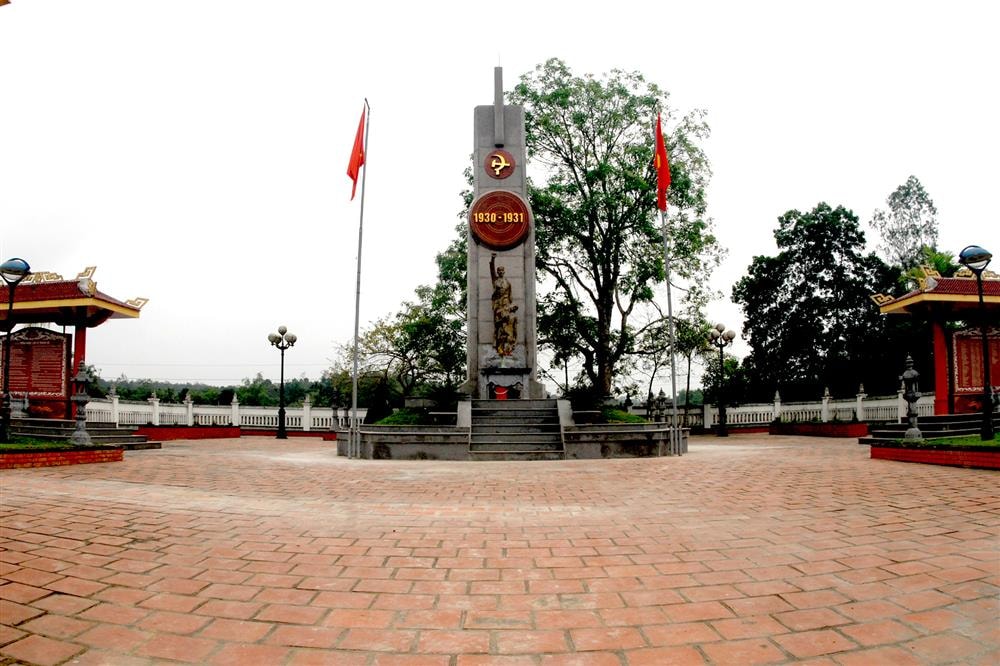
For their contributions to the local revolutionary movement, comrades Hoang Van and Hoang Bong were posthumously awarded the "Fatherland's Gratitude" certificate by Prime Minister Phan Van Khai according to Decision No. 1198/QD-TTg dated November 29, 2000.
In 1988, at Trang Ke relic, where the French colonialists executed two comrades Hoang Van - Hoang Bong and 70 other Nghe Tinh Soviet revolutionary soldiers, in response to the wishes of party members and people, the District Party Committee, People's Council, People's Committee, and Fatherland Front Committee of Yen Thanh district coordinated with the government and people of My Thanh commune to mobilize all resources to build a martyrs' monument and a stele to record the names of the martyrs who sacrificed here.
Trang Ke relic is a Red address where many gratitude activities have taken place such as: traditional talks, camping, organizing for local people and teenagers and children to come and offer incense and flowers... The names, contributions and sacrifices of martyrs Hoang Van - Hoang Bong in particular and of Soviet soldiers of Nghe Tinh in general will live forever in the golden history of the nation, becoming a shining example contributing to fostering patriotism and love for the homeland for all classes of people, especially the young generation.
-----
Note:
[1] Comrade Vo Mai (1891-1985) was from Dien Van commune, Dien Chau district, Nghe An province.
[2] Comrade Bui Xuan Nam (alias Nho Nom): hometown in Dien Kim commune, Dien Chau district, Nghe An province, married and lived in Xuan Lai village.
References:
- History of Yen Thanh District Party Committee (1930-2005), National Political Publishing House, 2010.
- History of Do Thanh Commune Party Committee (1930-1975), National Political Publishing House, 2013.
- Documents provided by the families of comrades Hoang Van and Hoang Bong.

